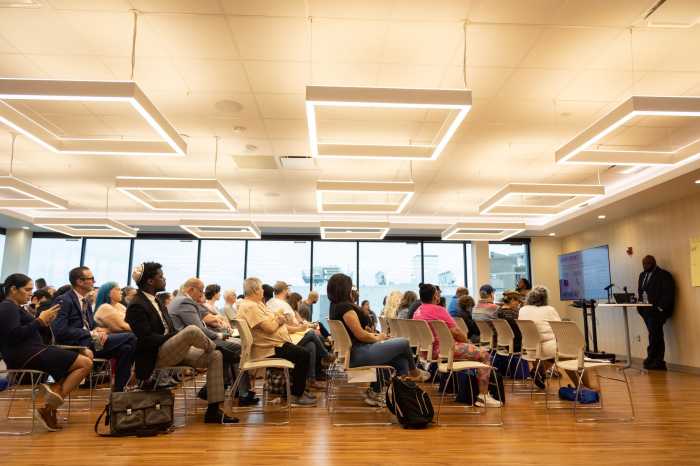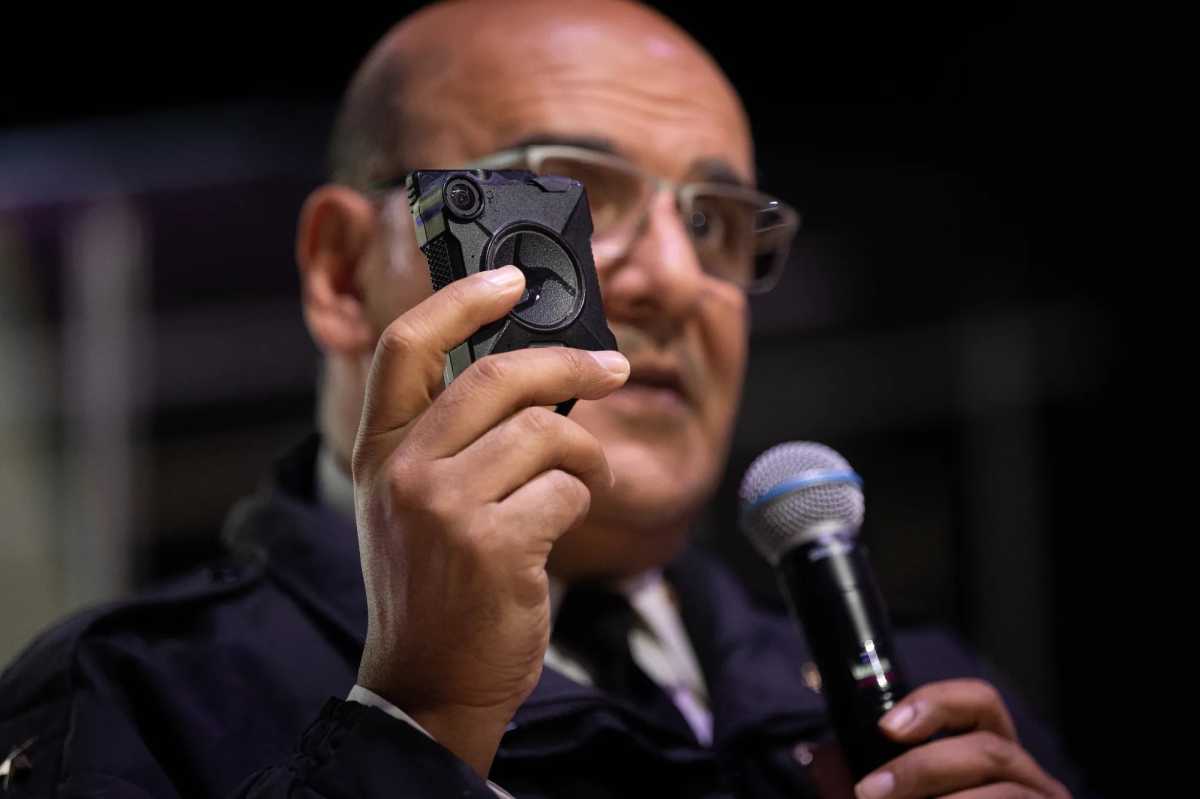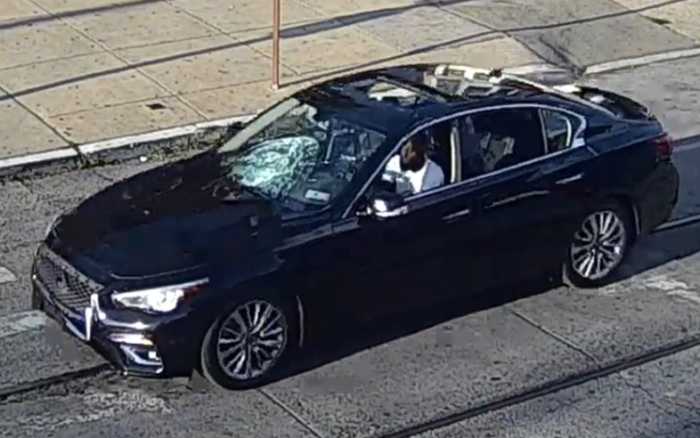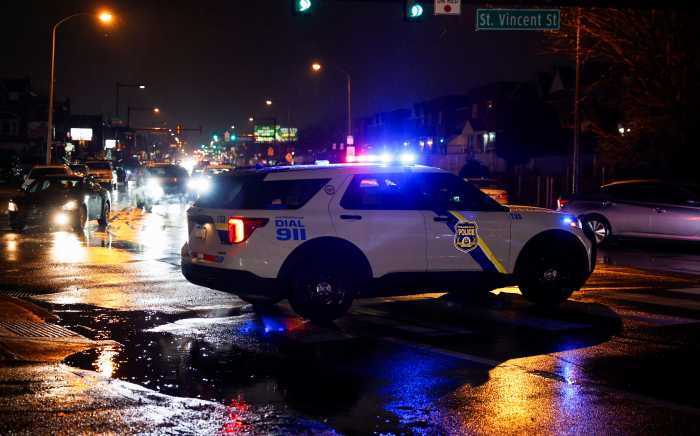This story was originally published by Kensington Voice.
A Citizens Police Oversight Commission review of body-worn camera footage from the 24th police district shows that Philadelphia Police Department officers are consistently complying with some department directives and commonly ignoring others.
The audit, released Wednesday, analyzed a random sample of 119 recordings taken during 64 vehicle stops in January 2025.
The Citizens Police Oversight Commission (CPOC) was created in 2020 as a response to the murder of George Floyd, and tasked with investigating the “conduct, policies and practices” of the Philadelphia Police Department (PPD).
The commission has been grappling with controversy and turnover since. And despite ongoing arguments with the city and police union, which continued up until this August, the agency still lacks the authority to independently investigate police misconduct.
Their body-worn camera review did not analyze who police officers stopped and why. CPOC also didn’t analyze whether any police misconduct occurred during these recordings.
The audit did find that of the 119 recordings analyzed:
- Only 54% met all criteria (full incident captured, activation from standby, no prohibited content).
- 61% captured the encounter in its entirety, while 39% either started late, ended early, or both.
- Nearly all (92%) were correctly categorized for storage and retrieval.
- No officers were observed recording prohibited activities such as private conversations, medical settings, or operational tactics.
In situations where an officer ended the recording early, only 6% complied with PPD’s requirement that they state their reason for turning off the camera.
In order to create the kind of transparency that prevents use-of-force incidents and increases public trust, officers need to keep their cameras on the whole time, said Hans Menos, vice president of public safety innovations at the Center for Policing Equity. Menos is also a former executive director of the Philadelphia police oversight entity that preceded CPOC.
“When the camera turns on and someone is already bleeding or already in handcuffs, what happened before that is pretty important,” he said. “That’s the point of the body-worn camera.”

These recordings are also relevant in the disciplinary process for officer misconduct, said Michael Tooley with CPOC’s auditing and research team. He called officers’ failure to capture an incident in its entirety “a major concern.”
“If somebody makes a complaint that an officer got nasty with them during a car stop, we want to be able to see the car stop from the time that the officer first interacts with that complainant to the time where they get in their car and they’re leaving,” he said.
The Philadelphia Police Department considers body-worn camera technology “a vital tool for transparency and accountability,” a PPD spokesperson said in a written statement.
“We are a learning organization, and audits like this help us identify ways to improve,” the statement read.
The spokesperson did not respond to a question about whether the officers whose recordings were found to be noncompliant in the audit will be spoken to.
Representatives from CPOC said any training, discipline or other changes resulting from the audit will be up to PPD.
“This is kind of the first step, starting to do these reviews, get this information out to the public, and sort of see how it snowballs from there,” said Janine Zajac, CPOC’s director of auditing, policy and research.
Calls for transparent policing have been ongoing in the Kensington area, which has seen police killings of Eddie Irizarry Jr, Angel Garcia, Alex Spencer and Ricardo Sosa in the last two years. The neighborhood has also seen an influx of police officers since Mayor Cherelle Parker took office.
“The 24th was a district that we wanted to put eyes on, especially with everything that’s happening in Kensington at the moment,” Tooley said.
The agency plans to conduct a similar audit in the 15th, 18th and 22nd police districts. Then “after a certain number of months have passed,” CPOC will repeat the audit in all four districts.
“To do basically a progress report,” Zajac said. “To come back and take another look.”
CPOC did recommend that PPD “reinforce” activation requirements during roll call, remind all officers to activate cameras prior to all stops and keep cameras on until the stop concludes, verify that cameras remain in standby mode and ready to record during patrol, and assign officers to review video tagging and labeling against written incident reports.
Menos, of the Center for Policing Equity, said the new audit suggests that PPD hasn’t been taking compliance seriously enough.
“In Philly, that is something that when not enforced, has become optional,” he said. ““When it gets measured, and when there’s accountability, that leads to change.”

A push for transparency
Police departments across the country have been grappling with how to manage body-worn cameras and the footage they capture since the technology came online about a decade ago.
Major metropolitan law enforcement agencies, such as the Los Angeles Police Department, are revising their body-worn camera review processes following discoveries of police misconduct. Some departments are using artificial intelligence to analyze the data.
Philadelphia, however, has been behind the curve on analyzing and sharing recordings compared to other cities, according to Menos.
“Other departments do a really good job at random audits,” he said. “Somewhere along the way we’ve lost the purpose of it. That’s how a lot of these policies have become insular and viewing of the footage has been strained.“
Back in 2018, Manos published a report calling on PPD to have supervisors conduct randomized, semi-regular audits of all body-worn camera footage. The department’s current body-worn camera directives don’t include that requirement.
Some advocates say footage will never lead to transparency as long as the Philadelphia Police Department has control of it.
“To me it isn’t actually a tool of accountability,” said Kaitlyn Amick, an organizer with the Philadelphia Party for Socialism and Liberation, “Millions of our tax dollars go to making sure cops have the highest tech equipment, but it’s still up to their discretion whether or not they use it.”
Footage of police misconduct should be more regularly released to the public, Amick said, and especially to the families of people whose loved ones were killed by officers.
“The police are really only accountable to each other.”






























